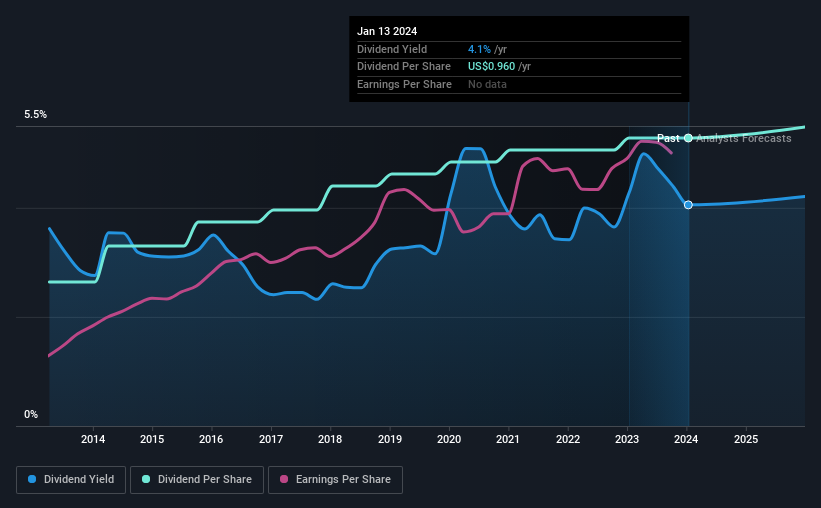First Busey Corporation's (NASDAQ:BUSE) investors are due to receive a payment of $0.24 per share on 26th of January. This makes the dividend yield 4.1%, which will augment investor returns quite nicely.
View our latest analysis for First Busey
First Busey's Earnings Will Easily Cover The Distributions
While it is great to have a strong dividend yield, we should also consider whether the payment is sustainable.
First Busey has a long history of paying out dividends, with its current track record at a minimum of 10 years. Past distributions do not necessarily guarantee future ones, but First Busey's payout ratio of 40% is a good sign as this means that earnings decently cover dividends.
Looking forward, earnings per share is forecast to fall by 4.3% over the next 3 years. Despite that, analysts estimate the future payout ratio could be 44% over the same time period, which is in a pretty comfortable range.

First Busey Has A Solid Track Record
The company has an extended history of paying stable dividends. The dividend has gone from an annual total of $0.48 in 2014 to the most recent total annual payment of $0.96. This works out to be a compound annual growth rate (CAGR) of approximately 7.2% a year over that time. Dividends have grown at a reasonable rate over this period, and without any major cuts in the payment over time, we think this is an attractive combination as it provides a nice boost to shareholder returns.
The Dividend Has Growth Potential
Investors who have held shares in the company for the past few years will be happy with the dividend income they have received. First Busey has impressed us by growing EPS at 6.2% per year over the past five years. Earnings are on the uptrend, and it is only paying a small portion of those earnings to shareholders.
We Really Like First Busey's Dividend
Overall, we think that this is a great income investment, and we think that maintaining the dividend this year may have been a conservative choice. The company is generating plenty of cash, and the earnings also quite easily cover the distributions. However, it is worth noting that the earnings are expected to fall over the next year, which may not change the long term outlook, but could affect the dividend payment in the next 12 months. All of these factors considered, we think this has solid potential as a dividend stock.
It's important to note that companies having a consistent dividend policy will generate greater investor confidence than those having an erratic one. At the same time, there are other factors our readers should be conscious of before pouring capital into a stock. Companies that are growing earnings tend to be the best dividend stocks over the long term. See what the 6 analysts we track are forecasting for First Busey for free with public analyst estimates for the company. Is First Busey not quite the opportunity you were looking for? Why not check out our selection of top dividend stocks.
New: AI Stock Screener & Alerts
Our new AI Stock Screener scans the market every day to uncover opportunities.
• Dividend Powerhouses (3%+ Yield)
• Undervalued Small Caps with Insider Buying
• High growth Tech and AI Companies
Or build your own from over 50 metrics.
Have feedback on this article? Concerned about the content? Get in touch with us directly. Alternatively, email editorial-team (at) simplywallst.com.
This article by Simply Wall St is general in nature. We provide commentary based on historical data and analyst forecasts only using an unbiased methodology and our articles are not intended to be financial advice. It does not constitute a recommendation to buy or sell any stock, and does not take account of your objectives, or your financial situation. We aim to bring you long-term focused analysis driven by fundamental data. Note that our analysis may not factor in the latest price-sensitive company announcements or qualitative material. Simply Wall St has no position in any stocks mentioned.
About NasdaqGS:BUSE
First Busey
Operates as the bank holding company for Busey Bank that engages in the provision of retail and commercial banking products and services to individual, corporate, institutional, and governmental customers in the United States.
Flawless balance sheet with high growth potential and pays a dividend.
Similar Companies
Market Insights
Community Narratives




